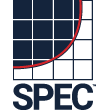SPEC releases power-performance benchmark for servers
WARRENTON, Va., December 11, 2007 — The Standard
Performance Evaluation Corp. (SPEC) has released SPECpower_ssj2008, the
first industry-standard benchmark that measures power consumption in
relation to performance for server-class computers.
SPEC has designed SPECpower_ssj2008 to be used as both a benchmark
to compare power and performance among different servers and as a
toolset to improve server efficiency.
"The power efficiency of servers has become a high-priority issue
for the IT industry, computer manufacturers, and governments," says
Klaus-Dieter Lange, chair of the SPECpower committee. "SPEC is taking
its proven methodologies for ensuring consistent, fair and repeatable
performance measurement and applying them to power consumption."
SPEC member companies active in developing the new power-performance
measurement standard include AMD, Dell, Fujitsu Siemens Computers, HP,
Intel, IBM, and Sun Microsystems. Associate members participating in
the effort include University of California - Berkeley, Lawrence
Berkeley National Laboratory, and Virginia Polytechnic Institute and
State University.
About the benchmark
SPECpower_ssj2008 reports power consumption for servers at different
performance levels — from 100-percent to idle in 10-percent segments —
over a set period of time. The graduated workload recognizes the fact
that processing loads and power consumption on servers vary
substantially over the course of days or weeks. To compute a
power-performance metric across all levels, measured transaction
throughputs for each segment are added together, then divided by the
sum of the average power consumed for each segment. The result is a
figure of merit called "overall ssj_ops/watt."
The benchmark workload represents typical server-side Java business
applications. The workload is scalable, multi-threaded, portable across
a wide range of operating environments, and economical to run. It
exercises CPUs, caches, memory hierarchy, and the scalability of shared
memory processors (SMPs), as well as implementations of the Java
Virtual Machine (JVM), JIT (just in time) compiler, garbage collection,
threads, and some aspects of the operating system.
The minimum equipment for SPEC-compliant testing is two networked
computers, plus a power analyzer and a temperature sensor. One computer
is the system under test (SUT), the other a controller system where
power, performance and temperature are captured for reporting. A
typical test run for SPECpower_ssj2008 takes about 70 minutes using
default settings.
"A critical first step"
Representatives from the Environmental Protection Agency (EPA) and
the Consortium for Energy Efficiency (CEE) have been monitoring SPEC's
progress in developing power-performance evaluation tools and see the
release of this first benchmark as a significant step forward.
"The ability to measure power consumption in a consistent way across
multiple server platforms is an important element of the Energy Star
program," says Andrew Fanara, director of the Energy Star Product
Specifications Development Team for the EPA. "SPEC has taken a critical
first step to give server vendors and their customers a standardized
benchmark tool that elevates power efficiency in the performance
evaluation process."
"The Consortium for Energy Efficiency is reviewing SPEC's latest
release," says Jason Erwin, who manages and supports commercial
programs for CEE. "A test procedure for server power performance that
is accepted by the industry could enable improved customer guidance
concerning potential energy savings. CEE benefits by working with
organizations like SPEC to ensure that industry-endorsed test methods
are available and accessible."
Available immediately
SPECpower_ssj2008 is available immediately from SPEC for $1,600;
discounts are available for qualified non-profit and educational
institutions. More details and order information are available at www.spec.org/specpower or through e-mail at
info@spec.org.
About SPEC
SPEC is a non-profit organization that establishes, maintains and
endorses standardized benchmarks to evaluate performance for the newest
generation of computing systems. Its membership comprises more than 80
leading computer hardware and software vendors, educational
institutions, research organizations, and government agencies
worldwide. For more information, visit www.spec.org or
contact the SPEC office by phone: 540-349-7878, fax: 540-349-5992, or
email: info@spec.org.
###
Media
contact:
Bob Cramblitt
Cramblitt & Company
919-481-4599; info@cramco.com
Product and service names mentioned herein may be the trademarks of
their respective owners.




